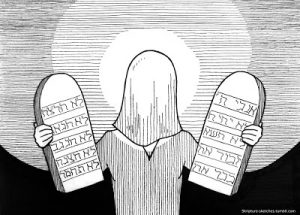If this is your first viewing, please see my Introduction before reading this.
26 January. Exodus chapters 25-27
After Moses receives the law, and reads it to the people, their next task is to build the Tabernacle (a portable place of worship for this nomadic people). The instructions are detailed, and many of its elements were perpetuated in the later Temple of Jerusalem and can be seen in Jewish or Christian places of worship to this day. The Ark which contained the book of the law, and symbolically the presence of God, is still the focus of the synagogues; and an altar (or communion table) the focus of most churches, where the sacrifice of Jesus rather than of sheep and oxen is remembered.
Some churches retain the pattern of outer court, holy place and “holy of holies” in the division of the building into nave, chancel and sanctuary with its fixed altar, while others consider that Jesus intended to abolish this pattern, and their buildings are a simple space where people can gather informally for prayer, singing and preaching with a portable table for the communion. Neither is “wrong” and the two different approaches represent the tension in worship between God as the ‘holy other’ and God as living among us as our Father and friend. What Moses’ Tabernacle does remind us, though, is that we are a “pilgrim people” and the building should never be an end in itself, or the people resistant to change. God calls us to journey with him both literally, and in our life of faith. As Richard Giles titled his much-read book on church architecture, we should always be “re-pitching the tent”.
